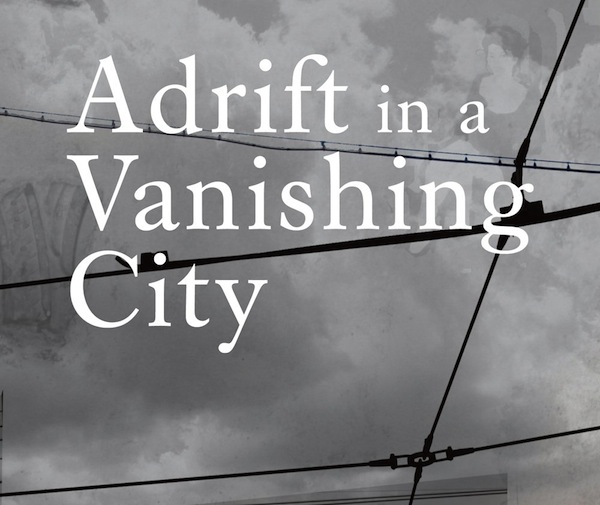Book Review: “Adrift” in a Memorably Neo-Beat World
The protagonist’s version of barroom existentialism works as an unofficial précis for the struggle to make it through another day of being human.
Adrift in a Vanishing City by Vincent Czyz. Rain Mountain Press, 235 pages, $15.

By Matt Hanson
In his introduction to Vincent Czyz’s Adrift in a Vanishing City, Samuel R. Delany cites a unique litmus test for proving literary originality. Delaney quotes Wyndham Lewis on how to know when you’ve found a true prose stylist: choose one page at random and read it aloud to a cab driver, asking if there is anything interesting or unusual in what they just heard. Adrift in A Vanishing City passes this test with a prose style as distinctive and memorable as the people it describes.
The text’s characters are a colorful and raffish bunch. Czyz has a neo-Beat attentiveness to the humanity of people who live on the periphery. We meet the globetrotting, streetwise Zirque (rhymes with “jerk”), his long-suffering companion nicknamed Blue Jean, who is referenced in David Essex’s haunting, near-forgotten ’70s era one-hit wonder “Rock On,” the lyrics of which Zirque swears he wrote himself even though he’s never seen any of the royalties. With a smile “slow as cigarette smoke making itself into a graceful coil” Zirque is the kind of charismatic autodidact whose education isn’t limited to the world of books.
Zirque, the elusive hero of the book, explains his philosophy: “you carve outta whatever your knife can cut into something you can live with, your initials, a grinning god, a back porch. You surround yourself with things a your own doin, somethin a’ the way a seein’ things you’ve come to call your own. An’ you make an uneasy peace with things your blade can’t scratch.” Zirque’s version of barroom existentialism works as an unofficial précis for the struggle to make it through another day of being human.
The loyal but lonely Blue Jean waits for her man as she cooks an elaborate meal she knows might well be served for one. Czyz’s prose is never far from the imagery of romantic longing, and Blue Jean suffers more than her share of quiet heartbreak. We also meet the self-styled man about town “Duke of Pallucca” who walks at night with the streets of Pittsburg as his retinue, his shabby apartment filled to the ceiling with books, and a Parisian aesthete whose Baudelairean ennui is both seductive and incurable.

Author Vincent Czyz — he has a strong feeling for the power of history to haunt the present.
Czyz’s characters are the kind of people who usually don’t receive this level of attention and sympathy in real life for the simple reason that they are usually too busy being engaged in their private ruminations to bother courting it. Another writer might have seen personalities like Zirque and The Duke as grotesques and played them for laughs, but Czyz takes them seriously; their messy but compelling lives are imbued with a dignity and poetry all their own.
Adrift also re-imagines the meaning of place. Each chapter is set in a drastically different location, shifting with ease from the Americana of Pittsburg, Kansas to the weathered, world-weary cities of Paris, Budapest, and Amsterdam. Even though the drama often resides in the mental and emotional lives of the characters, Czyz has a strong feeling for the power of history to haunt the present. The exotic locales aren’t merely used for window dressing. As a Hungarian and an American talk in a park, the ghosts of the past are never far away: “The history of Hungary built on the threat of dissolution…students who stood in every square before the stern bronze face of a national hero and defied the Russians that October night in 1956.” While telling the stories of people whose lives can easily go unnoticed, Czyz evokes history’s lethal power to propel the personal into a larger, more interconnected context.
The lack of a conventional narrative is occasionally jarring. The final chapter takes us suddenly and inexplicably into fragments of Canaanite parchment describing some bizarre and confusing quasi-religious rituals and escapades. The abrupt shift feels glaringly out of place for a narrative that works best when it stays on the peripatetic trail of its cast of characters, who can fill pages with a single memory or a particularly heated argument over a bottle of booze.
Sketched in brief but intense glimpses, Czyz captures the voices of people who haven’t “made it” in any conventional sense but whose stories are vital, authentic, and imbued with a language that fits their nonconformity and casual sophistication. Adrift in a Vanishing City is impressively at home wherever its characters may roam, mentally or physically, subtly reminding us that part of life in the 21st Century means that even on the lower frequencies, we act local but think global, whether anyone is there to notice or not.
Matt Hanson is a critic for the Arts Fuse living outside Boston. His writing has appeared in The Millions, 3QuarksDaily and Flak Magazine (RIP), where he was a staff writer. He blogs about movies and culture for LoveMoneyClothes. His poetry chapbook was published by Rhinologic Press.
